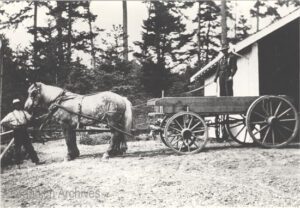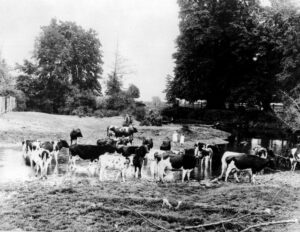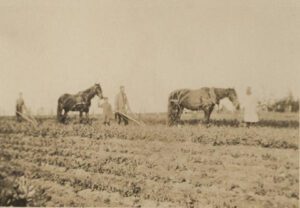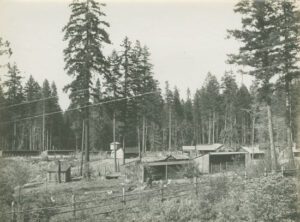AGRICULTURAL RESOURCES OF VANCOUVER ISLAND. DAILY COLONIST, JANUARY 20, 1901.
Fertile Soil and a Mild Climate Conducive to Successful Farming – Fruit, Livestock, Grain, Vegetables and Poultry Flourish.
The agricultural history of Vancouver Island, like that of all new countries, is strewn with the wrecks of experience. Hundreds of young men emigrated from Great Britain, animated with an ambition to conquer nature in her fastnesses and hew a fortune from the primeval forest, only to find themselves, after a few months or years of misdirected effort, self-confessed failures. The majority of these young men were not to blame for the disastrous results of their experiments in farming. They were honest and ernest in the first place and attacked their unwanted surroundings with a determination to succeed but they lack knowledge. Many of them had never handled an axe, and a plow was but a name to them and a harness an intricate puzzle. They were strong and energetic, but knew not how to utilize those qualities to advantage in their daily routine of work to their lands the farm, then their surroundings appealed to the old sporting blood in them and by easy stages they abandoned a legitimate work and took to gun and rod for subsistence, letting the farm, or “ranche”, take care of itself. This class of “farmer” has done the Island much harm, by discouraging the immigration of genuine farmers, and locking up large areas of land that might be cultivated with profit, for naturally the unsuccessful ones hold on to their lands and look to the sale of them to recoup them for the time and money lost. Many of these abandoned farms can be bought at reasonable prices and some, with good buildings on them, prove profitable investments to men of moderate means and experience. The successful farmer of Eastern Canada can find on Vancouver Island many improved properties that would make a delightful retreat in which to spend the autumn of his life, for it is a fact that an improved farm here will give an insured income with less exertion and amid more pleasant surroundings of scene and climate than the most favoured sections of the East.

There is no portion of Canada that affords better inducements to farmers then British Columbia and no part of the province which presents more favourable conditions than Vancouver Island. True, the farming land is confined to comparatively small areas and is, as a rule, heavily timbered, but as an offset it is of remarkable fertility, so that a few acres cleared and systematically tilled will yield a comfortable living. All the cereals grow to perfection, leguminous plants, fruits and vegetables of all kinds that are produced in the temperate zone, grow to large size, and of excellent quality. Apples, pears, plums, prunes, cherries, and all the small fruits attain great perfection, while peaches, apricots, nectarines and grapes, if given special care, can be produced successfully. Many varieties of nuts, almonds, filberts, walnuts, hazelnuts, cob nuts, chestnuts, do well wherever cultivated. Flax of excellent quality is grown, but so far has been used only for cattle food, although the fibers are produced is long, fine and silky, yielding from 2 to 3 tons per acre. The cultivation of flax for purposes of export has been depreciated by some practical agriculturists because the area of the land available for food products is too limited to admit of flax culture to an extent that would insure its success. Hops growing luxuriantly and yield from 7 ½ to 9 tons per acre. Cattle, sheep, swine and poultry do well on the Island, the climate being particularly favourable to them, the mild winters permitting them to roam at large and pick up an abundance of green food practically all year round.
An excellent synopsis of the agricultural conditions prevailing on the British Columbia Lower mainland coast and which applies to those of Vancouver Island is contained in Mr. R. E. Gosnell’s Yearbook of British Columbia: “A decidedly humid atmosphere, a good deal of rain during the winter months, no extremes of heat or cold, a long growing season, cool nights and profuse vegetation. It is scarcely necessary to explain the effects of such conditions – tree growth is generally greatly stimulated; roots and vegetables flourish; the softer grains, such as oats and barley, yield largely and grow to great perfection; grasses are abundant; fruits, such as pears, cherries and plums and all small fruits are practically indigenous to the soil and yield an enormously; flowers, especially roses, and all the good old-fashioned varieties, our profuse bloomers; and shrubbery is dense. It is a country of great growth, and where fertile soul deposits exist no better results can be had anywhere. Unfortunately, the benefit initial effect of the climate in contributing such favourable conditions is accompanied by corresponding disadvantages in the creation of dense forests and thick and heavy undergrowth, in encouraging the growth of weeds and in the propagation of insect pests and plant diseases once they have found a foothold. Under average conditions, to clear a farm for cultivation requires much more labour than it does to keep it in a clean healthy condition. Eternal diligence is the price of immunity from weeds second growth and insect pests. On the other hand intensive farming gives wonderful results. It is no country for a lazy or indifferent farmer.” Insect pests and plant diseases are of imported origin and though much damage and annoyance has been caused by them the Dominion and Provincial departments of agriculture have taken rigid measures to prevent their further ingress and their baneful effects are being successfully combated.
While farming operations on Vancouver Island are particularly adapted to those possessing capital the poor man need not be discouraged and taking up land. The government, recognizing the difficulties of clearing the land, gives ample time in which to perform the improvements prescribed in the regulations, and the vast amount of mining and lumbering being done affords opportunities to the man of small means to secure profitable employment at seasons when he cannot work to advantage on his homestead. These opportunities promised to be greatly increased in the near future when railway building on an extensive scale will be undertaken.

While the agricultural possibilities of the island have not received the attention which their importance and merits, they have by no means been neglected. Agricultural Associations, Farmers Institutes, Cooperative Bearing Associations, Fruit Growers Association’s and other societies have been formed under the auspices of the government and officers of the Department of Agriculture and government agents are stationed at various points to report the progress and requirements of their respective districts. Agricultural exhibitions are held annually at Saanich, Duncan, Nanaimo, Wellington, Comox and other points. This year, 1901, the British Colombia Agricultural and Industrial Association of Victoria, will hold a provincial exhibition at the capital which, it is expected, will excel all former efforts in that direction. The Dominion Government is also manifesting an interest in the agricultural affairs of the island and promises to establish an experimental farm and a dairy school during the coming season.
The social conditions of the farmers of Vancouver Island are preferable to those of many districts in the older provinces. The settlers are, as a rule, of a superior class and cultivate the amenities of life, devoting their spare time to social intercourse, each settlement vying with the other in the quality of its amusements and entertainments. Farming life on Vancouver Island is modelled on that of England and, although many of the charms that make the latter almost ideal are wanting, sufficient of the good old ways are preserved as to render existence very enjoyable. Excellent public schools are found everywhere and there are few districts that have not one or more clergymen and churches.

Such fruits as apples, pears, plums, prunes and cherries are all grown in abundance on Vancouver Island and throughout the southern portions of the province, but still not in sufficient quantities as yet to supply the demand of the markets that practically belong to British Columbia, viz.: Manitoba, the Western Territories, including Alberta, Saskatchewan, Assiniboia, and Athabasca, and the Northern mining country, Atlin and Yukon. Young orchards which are coming into bearing will, in a few years, considerably alter the complexion of affairs as regards production. Nevertheless as the demand is steadily increasing in the markets named and as a markets of China and Japan are opened up for such products, there need be no fear of overproduction, and so long as the fruit is of good quality and is packed as it should be for the market, so long will the production of fruits be a profitable industry on Vancouver Island and the Province of British Columbia generally. Owing to the climatic conditions it is but reasonable to expect that all the varieties of fruits will not exceed equally well on Vancouver Island and it is of the utmost importance that intending orchardists should bear this in mind and before planting out an orchard, they should ascertain from the Department of Agriculture what particular species of fruit suit the locality in which they propose to establish themselves. All the best known and favourite English and American varieties of apples and some of the Russian varieties do well in one section or another of the province and this is true of other fruits, but to the man who contemplates embarking in fruit growing on Vancouver Island it is important that he should secure the knowledge, gained by long experience, as to the best of varieties suited to his purpose.

The opportunities for dairying are exceptionally favourable, for besides the local market which absorbs the entire product and is still far from supplied, the progress of mining and lumbering is constantly creating new demands and the Oriental trade, as yet in its infancy, assures a continuance of good prices for very many years. The equable climate affords facilities unequaled for winter dairying, the most profitable branch of the business, and any portion of the Dominion. Clover and vetches grow in marvellous profusion during the long summer season with its cool nights and pleasantly warm days and no difficulties experienced in providing succulent green food in abundance during the summer months. For winter dairying, however, outside green food cannot be depended upon entirely in routes and silage will have to be resorted to to keep the cows in condition, for while green food is available during most of the winter months it is a well-known fact that cows in milk cannot be allowed to roam about the fields on cold, wet days and at such times shelter and food must be provided. Dairying is, without question, a branch of agriculture capable of great expansion and favoured by the conditions existing on Vancouver Island. It presents more opportunities for the profitable investment than most others. The whole market alone will consume all that can be produced for some time to come for, as already remarked, the demands of that market are continually increasing. Is not possible to give figures for the Island, but when the latest statistics were made up by the provincial Department of Agriculture the importations of dairy products to foreign countries and from other provinces to British Columbia were as follows
Pounds | Value | Duty paid | |
Butter | 1,980,800 | $419,940 | $11,159.04 |
Cheese | 432,878 | $42,695 | $987.70 |
Concentrated milk | 1,018,173 | $116,586 | $7224.50 |
Total | $579,221 | $19,371.39 |
Since these statistics were made up the markets of the Northern mines have been opened up and those of the Orient have greatly developed. It will, therefore, be reasonable to expect that prosperity will reward the efforts of the agriculturists, the stock raiser and all of those engaged in any branch of this important industry. The price of butter seldom falls below $.18 and it often goes up as high as $.35 and $.40, probably $.25 may be quoted as an average price. Interesting dairying is increasing in British Columbia and especially on Vancouver Island. The Dominion Government working in conjunction with the provincial Department of Agriculture are taking steps to introduce the most approved methods of butter making and the establishment of a dairy school on the Island is promised in the near future. Lecturers on scientific dairying are delivering lectures before the numerous Farmers Institutes the effect of which cannot fail to prove beneficial to the industry. Poultry experts are also sent out by the Dominion Government to instruct the farmers in the proper care and treatment of fowls, preserving and packing of eggs, and the preparation of fowls for the market. These lectures and the numerous societies for mutual improvement and combined effort which have been formed among the farmers of Vancouver Island are beginning to make themselves felt in more intelligent work in all branches of agriculture and must eventually tend to greatly improve the conditions of the agricultural community.
The production of poultry is another industry which will well repay intelligent prosecution at points with an easy distance of Victoria and other commercial centres. That this industry is being neglected is clearly demonstrated by the following figures which show the importations of poultry and eggs into British Columbia for one year:
Value | Duty paid | |
Dressed poultry | $30,351 | $1073.20 |
Eggs – 831,601 dozen | $118,413 | $8322.11 |
Total | $148,764 | $9400.31 |
Two which should be added the importation of live fowls, including amongst other livestock. Barnyard fowls that for $.35-$.75 each, the former price being exceptionally low, an average price of $.50-$.60 may be quoted. Eggs are seldom lower than $.25 per dozen and often as high as $.75. Ducks and geese are easily raised and are a source of great profit. Ducks find a ready market, wholesale, at $4.50 to $5.50 per dozen, key cell at one dollar each and turkeys are from $.17-$.25 per pound.
Cattle raising, as an industry is not carried on to any great extent on Vancouver Island, the restricted area of open land prohibiting the prosecution of the business on a large scale. The cattle raised however, are of excellent quality and make a superior article of beef. The bulk of the beef cattle produced in the province are raised in the portion known as the drive belt or Upper country, where they roam over vast rages covered with wild grasses, principally the justly esteemed bunch grass. As the land is cleared by lumbering and farming operations and the interior valleys are made accessible by railways the cattle raising industry will doubtless increase upon the Island, and in time may grow to a sufficient volume as to supply the Victoria market with homegrown beef. At the present time, notwithstanding the large product of the ranges of the interior and the imports – from the adjoining Territory of Alberta – British Columbia has to look abroad for a considerable share of its beef. The following shows the imports from the United States for one year:
Quantity | Value | Duty | |
Cattle on foot | 2222 | $118,058 | $520.60 |
Beef | 244,481 pounds | $14,886 | $201.62 |
Total | $132,944 | $722.22 |
ORIGINAL ARTICLE IS MUCH MORE DETAILED AND CONTINUED.
